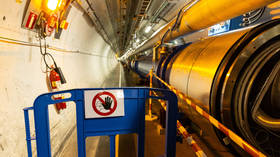Ukraine conflict leaves scientific cooperation in disarray – media

The ongoing conflict between Russia and Ukraine has significantly affected international cooperation between physicists at CERN’s Large Hadron Collider (LHC), with some scientists refusing to co-author papers with Russian researchers, The Guardian reported on Sunday. The issue has already led to a drastic drop in publication and is expected to yield more problems for scientists, PhD students and postdocs in the future.
Before the conflict, Russian institutes and individuals contributed to some 7% of collaborations at CERN (the European Organization for Nuclear Research), the newspaper said, citing sources at the organization. Since the conflict between Moscow and Kiev broke out last February, a hostile attitude towards Russians has been exhibited by many European scientists, Fedor Ratnikov, a Russian physicist who used to work at the LHC before 2016, has said.
“We have Ukrainian collaborators for whom this question is naturally extremely painful. [But] most of my Ukrainian colleagues do not extend responsibility for the invasion to their colleagues from Russian institutes. I would say that some of my EU colleagues are much more radical,” Ratnikov told the newspaper.
The situation has led to a “stalemate” in the publication of new papers, which have been piling up in a pre-published limbo while lacking proper credits and attribution. If not resolved shortly, the standstill is expected to create even more problems in the field, said an unnamed scientist “from outside Europe” who works at the LHC.
“Keep this political approach for some time and it can create problems for students, postdocs and for ourselves,” they warned.
The situation around publications is a purely political issue, a spokesperson for the Atlas experiment, Andreas Hoecker, confirmed. The issue is “solely related to the form of the institutional acknowledgment, given the statements of high-level representatives of Russian academic institutions… and the links of high-level funding bodies with the Russian government,” he told the newspaper.
CERN is the largest high-energy physics laboratory in the world, best-known for operating the LHC, a massive installation created by physicists from a number of countries. The site is home to the Atlas, the largest-in-kind general-purpose particle detector experiment.













